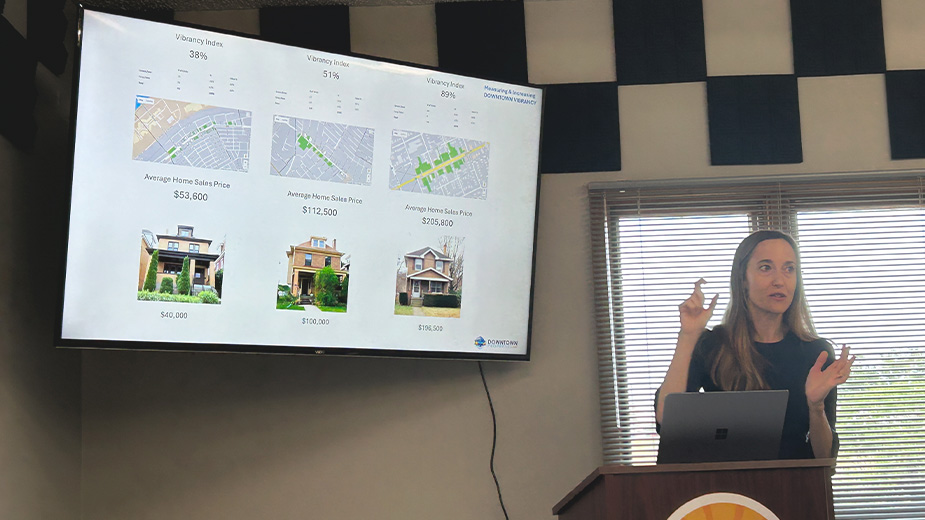Black Businesses Grow with DIY Determination
YOUNGSTOWN, Ohio — The breadth of entrepreneurship stretches far and wide. It encompasses segments ranging from retail to real estate, from hardware to health care. And within all of those sectors, one demographic is getting into business more than any other: black women.
Nielsen reports in a study conducted in 2017 that the number of businesses owned by black women increased 67% between 2007 and 2012, far outpacing the 27% growth for the overall female population. According to the U.S. Census Bureau Survey of Business Owners in 2015, the most recent available, black women were the majority owner of more than 1.5 million businesses nationwide, accounting for $42 billion in sales and $7.7 billion in payroll.
Even with that growth, however, there are certainly challenges. The average revenue for businesses owned by black women was $24,700, far below the all-women average of $143,100, according to the American Express 2018 State of Women-Owned Business report. If those figures were comparable, the report estimates, businesses owned by black women would add 4 million new jobs and $1.2 trillion in revenue to the economy.
“There’s a disconnect between the main business artery and the minority community. We’re working to bridge that gap, introducing the minority community to the artery and the resources that are here for them,” says Carmella Williams, director of the Minority Business Assistance Center, housed at the Youngstown Business Incubator. “We see new businesses come through the door on a daily basis.”
Williams also owns her own business, the natural-hair products line Carmella Marie.
Last year, the center aided more than 200 businesses, both startups and existing companies. While not technically part of the Minority Business Assistance Center, the Women in Entrepreneurship program at YBI has also served as a catalyst for businesses that black women own.
After returning to Youngstown from Nashville to launch her business, Dough House Cookies, in 2016, TaRee Avery went through the WE program, leveraging connections there to move into a small retail space inside the Canfield branch of the Public Library of Youngstown & Mahoning County.
“Our menu fit. Our price point fit. We were able to pitch them something that’s different from what’s been here in the past,” Avery says, noting the space has helped to keep the company stable through the lull in business between the holidays and wedding season in the spring. “The lull in between is where we were hitting a growth issue. The library helped fill those gaps when events weren’t happening.”
With demand growing, she will move her baking operation into the commercial kitchen at the Youngstown Neighborhood Development Corp. headquarters later this summer, which will help her secure business with retailers that require food be produced in licensed kitchens. Currently, the home kitchen she uses is only USDA certified and falls under the purview of the Ohio cottage-industry law, which allows baked goods made at home to be sold.
Also coming through the Women in Entrepreneurship program is Gigi Johnson, founder of SheaMergency in Warren. Although she went through the course for another business, the lessons she learned and the connections she made helped launch her new company that sells shea-butter based products, including deodorants, lotions and balms.
“It’s been interesting. It’s been fun. It’s been a faith walk. I don’t know everything that a full store entails, but the inventory alone is massive,” she says as she prepares to open a small retail space in the Focus Building, 2051 Niles Road SE in Warren. “At home, you can make to order but here I have to have a lot of inventory that I have to take on. It’s a challenge, but it’s fun.”
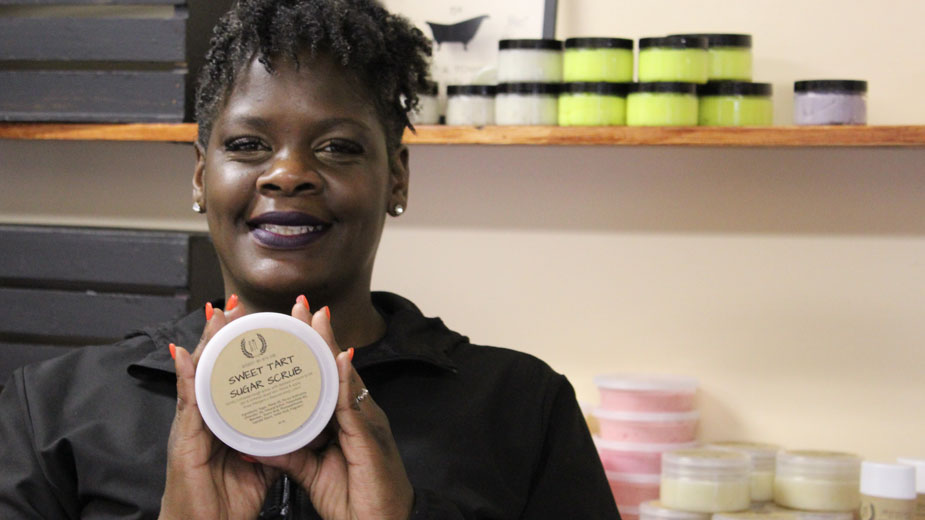
Johnson launched her business in 2017 as an online store and is now working to have her brick-and-mortar location open by the end of June. Her five-year goal, she says, is to have product sold to 50 homes in 50 states.
Meanwhile, Auzuree Johnson has expanded her clientele by going into businesses rather than homes. A licensed massage therapist, she started Massauzuree in 2015. While she rents space in Back to Health Chiropractic & Massage Therapy in Poland, she conducts most of her business by going into offices.
“When you go into a workplace, there’s a high level of stress from people just trying to do their jobs. They work long hours,” she says. “When I come in, I’m providing stress relief, comfort and helping people deal with that tension. My main thing is to help people feel better and to relax.”
When she was starting out, Auzuree Johnson turned to a Facebook group of other massage therapists that helped her figure out the business side of her company.
“I found out what they had done and what I needed to do. I invested in myself by taking continuing-education courses just to get that knowledge,” Auzuree Johnson says. “I have spent a countless number of days just trying things, failing and trying again.”
Having a mentor is something all three women credit as part of their success. Those relationships provide someone who can answer questions quickly or become a rock during difficult times.
Finding mentors, especially those who have a lifetime of experiences, isn’t always easy in the black business community, regardless of gender. It’s why James Cobbin, whose first entrepreneurial endeavor was in 1967, stands ready to help.
“I try to help whoever I can, whenever I can. I know the struggles,” says the owner of Inner City Transit. “As a black businessman, the experience is something no one else has. … You can’t have a banker tell you they’ll help you get started in business when they don’t know what the struggle is. They don’t know the trials and tribulations of becoming a minority business owner.”
Started as a busing service for Cobbin’s travel agency, Inner City Transit today focuses on local travel and maintains a fleet of buses, cars and limos.
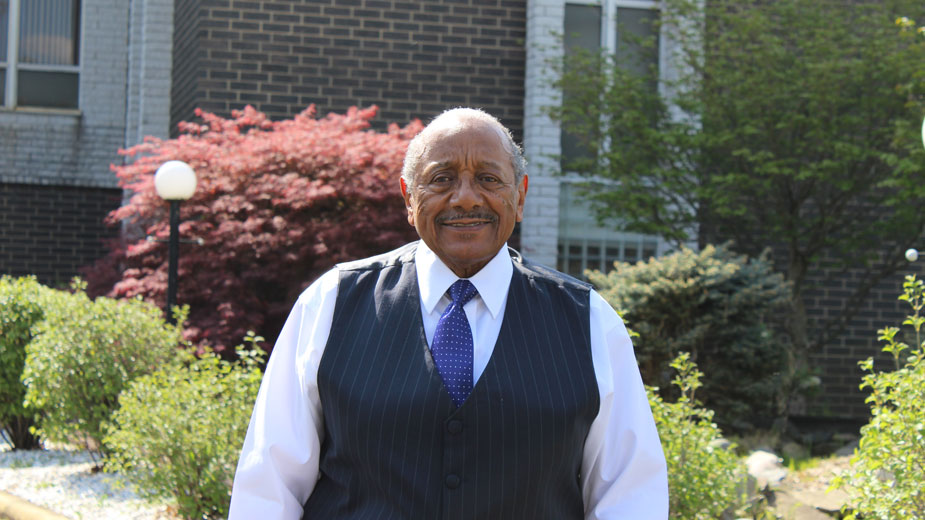
Over the course of his career, which began in 1967 with the opening of the Rayen Avenue Professional Building at the intersection of Rayen Avenue and Walnut Street, Cobbin has seen access to capital as one of the largest barriers minority business owners face, whether through firsthand experience or seeing what other businessmen endured.
When he was working to get financing to purchase his current building, W.J. Cobbin Tower on Fifth Avenue, in 2003, he was dealing with a local bank and said he’d put $300,000 down on the purchase.
“The committee wanted to know one thing. They wanted to know where I got the money from,” Cobbin recalls. “If DeBartolo came in here and asked for $300,000 down, would you ask him where he got his money from? Do you think I got that money illegally? I’ve been a businessman a long time.”
For the startups, their race also affects business in both visible and invisible ways.
“As a black woman, I get a lot of side-eye, a lot of judgment, just from the look of me. There’s, ‘She’s a woman. She’s black. She’s little. She doesn’t have the power to do it,’ ” Auzuree Johnson relates. “There are people who’ve pulled my hair because they thought it was a wig.”
Meanwhile, Avery says that when she attends an event and doesn’t sell well, race is among the questions that creep into her mind.
“You don’t know if it’s because of the audience or event or your price or because they just don’t want to buy from you. You don’t know if your race has any impact on what you’re doing,” she says. “There’s that head game you play with yourself. I don’t immediately go to it, but it does happen.”
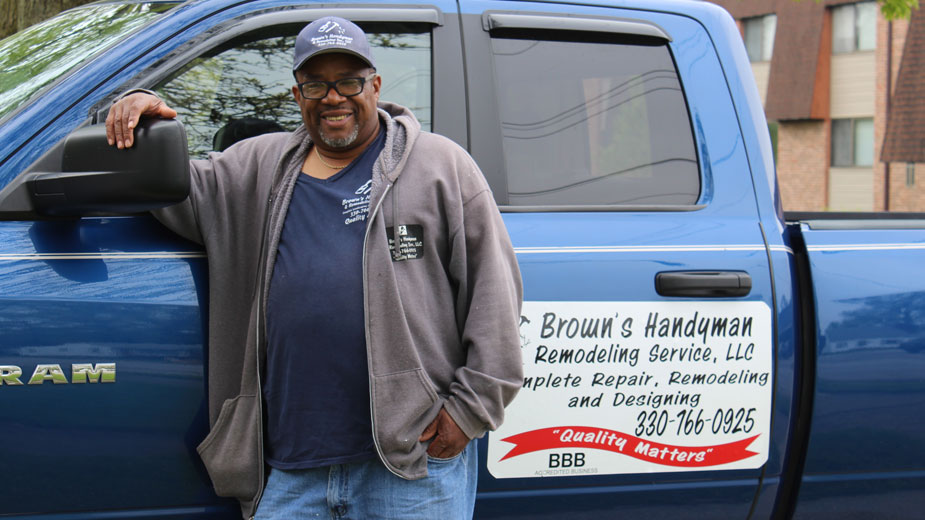
As a then-27-year-old entrepreneur, Jarome Brown says that kind of fear was the first challenge he overcame, but one he got over quickly. The company that is today Brown’s Handyman & Remodeling Service, Warren, was started more than 30 years ago as a landscaping business while he was also working for General Motors.
“I learned early on that it’s not so much what you’re selling, but it’s you that you’re selling. You have to learn how to get people to trust what you do,” he says. “I never thought that white people would open the doors to their $300,000 home when I just got out there. I would knock on people’s doors and they’d buy the designs I was selling.”
Over the 15 or so years he’s done remodeling and basic home repairs, Brown has found a niche in handling smaller jobs that the larger contractors don’t take on, as well as by expanding his services, such as snow plowing, to get the company and its two other employees through the off-season.
“It’s hard sometimes, but we’re staying afloat,” Brown says.
That kind of “go out and do it” mentality is commonplace in the black business community, observes Kwai Daniels, owner of DP Visual Media in Youngstown.
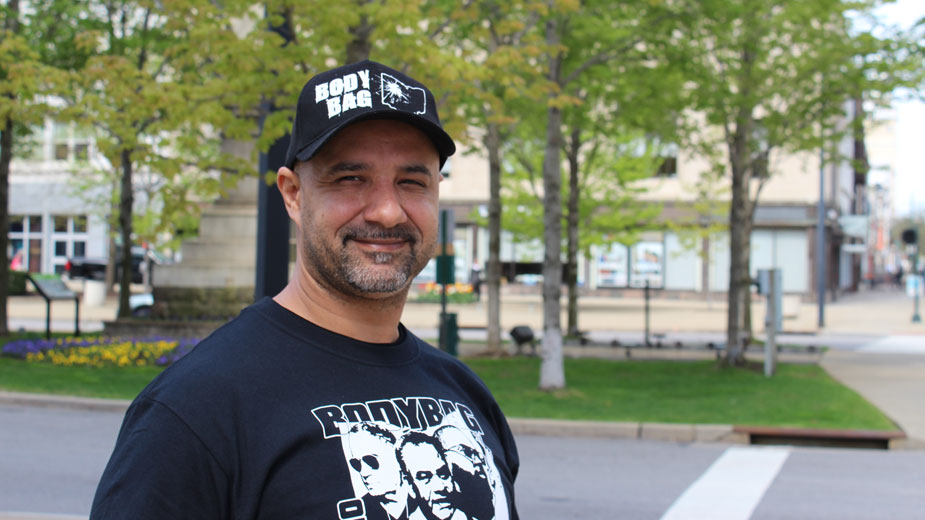
“Youngstown breeds a lot of entrepreneurs and a lot of it is because economic development is so poor,” he says. “It breeds someone that says, ‘I’m going to start my own restaurant since I can’t find work, can’t find a job.’ Entrepreneurship is high because people do it themselves.”
Much of Daniels’ attention is turned toward filmmaking – he’s wrapping up post-production on his next movie, which will be released this summer – but he does shoot some commercials and music festivals in the city. Among his previous businesses are a clothing store and a restaurant, he says.
All see the minority-business community growing. Last year, the U.S. Small Business Administration Office of Advocacy reported 122,602 minority-owned businesses in Ohio, employing 153,645. In Pennsylvania, there were 131,462 such businesses employing 166,074. The hardest step, these business owners agree, is the first one.
“It’s a lack of knowledge and a fear because you don’t know what to do,” says SheaMergency’s Gigi Johnson. “It’s not something we grew up doing. We grew up going to work, not starting businesses, so it’s unfamiliar. That can cause us to be fearful of trying and as soon as you hit a roadblock, you stop.”
But there are more willing to put themselves out there, they acknowledge.
“There are so many on the rise. It’s hard for us as a whole to make our way through that door because we were looked at as littles. It’s definitely changing now,” Auzuree Johnson says. “We want to put dollars back into our community and build ourselves back up. We realize the importance now and we’re unified, working together.”
Observes the Minority Business Assistance Center’s Williams: “There’s a surge in the minority business community where a lot of people are able to see a clearer pathway to success. One of those pathways is the Minority Business Assistance Center, which is able to assist individuals and direct them toward more opportunities, as well as resources that will help them build their brand and the backend.”
As Cobbin sees it, one key to building the black business community in the Mahoning Valley is support. And, the support has to work in both directions, both from patrons and the business owners themselves.
“The black community is moving forward because the public is realizing you must support your own. That’s helping a great deal,” he says. “When I started an office supply in 1970, I wanted to create a business for the whole community. Particularly in the black community, you find most of the businesses are the routine things – a barbecue store, a barbershop, a mechanic – but nothing that represents the entire community.”
Seeing black-owned businesses in their own community is key for fostering the next generation of entrepreneurs, Gigi Johnson says. Her store is a couple of blocks away from the commercial corridor of U.S. Route 422. In choosing the space, the fact that it was in her neighborhood was one of the most important factors.
“I want them to learn like I learned. I want them to see this is possible,” she says. “I’ve already seen it in my kids. They tell me, ‘Mom, I want to go into business when I grow up. Mom, I want real estate.’ Why go somewhere else when I can influence those that are already around me?”
Whether new enterprises or long-time ventures, all the business owners have gathered lessons about business that have served them well and can help others.
“It’s all about passion. If you’re passionate about something, you’re going to write the story just like a painter paints a picture,” DP Visual Media’s Daniels says. “You don’t have to be paid to do something you love, but when you do get paid, it’s a bonus. You’ll get paid in this business once people find your work and say, ‘This is what I’m looking for.’ ”
In the face of challenges, the key is to keep going, Dough House’s Avery says.
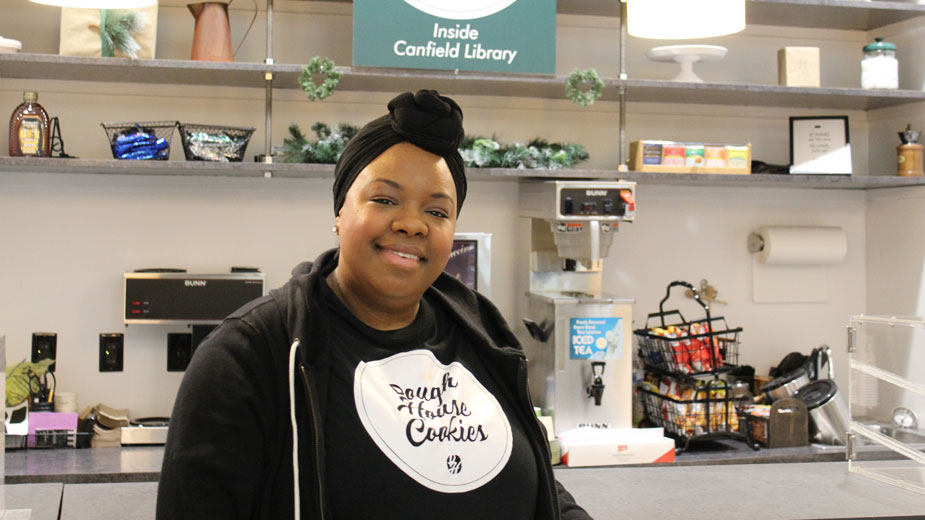
“You have to, at least for a period of time, take quitting off the table. There are just too many reasons to throw in the towel. You have to see yourself through the low points to see if you can rebound,” says Avery.
With more than 50 years of business experience, Cobbin says that knowledge beyond your sector is a must. “What’s necessary for a black entrepreneur is that he has to know what business is all about. You need to know something about law. It’s not about being a lawyer, but you need to know it so people can’t bully you away,” he says.
Copyright 2024 The Business Journal, Youngstown, Ohio.


